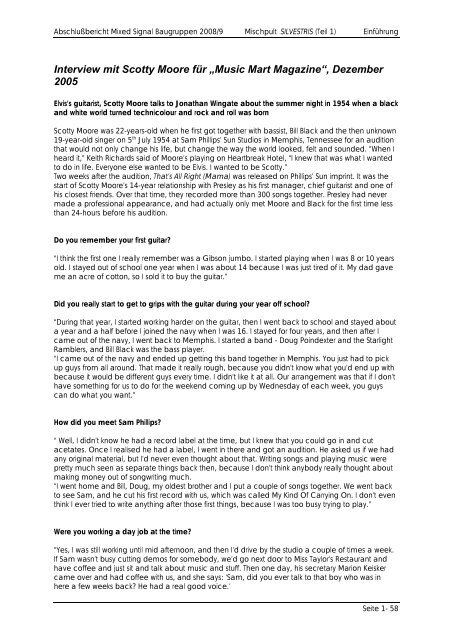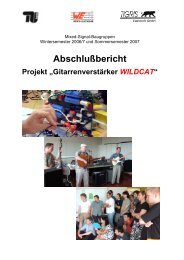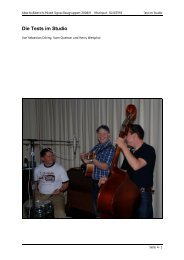Das Mischpult SILVESTRIS – Ein Vollröhren-Mischpult für ... - EMSP
Das Mischpult SILVESTRIS – Ein Vollröhren-Mischpult für ... - EMSP
Das Mischpult SILVESTRIS – Ein Vollröhren-Mischpult für ... - EMSP
Create successful ePaper yourself
Turn your PDF publications into a flip-book with our unique Google optimized e-Paper software.
Abschlußbericht Mixed Signal Baugruppen 2008/9 <strong>Mischpult</strong> <strong>SILVESTRIS</strong> (Teil 1) <strong>Ein</strong>führung<br />
Interview mit Scotty Moore <strong>für</strong> „Music Mart Magazine“, Dezember<br />
2005<br />
Elvis’s guitarist, Scotty Moore talks to Jonathan Wingate about the summer night in 1954 when a black<br />
and white world turned technicolour and rock and roll was born<br />
Scotty Moore was 22-years-old when he first got together with bassist, Bill Black and the then unknown<br />
19-year-old singer on 5 th July 1954 at Sam Phillips’ Sun Studios in Memphis, Tennessee for an audition<br />
that would not only change his life, but change the way the world looked, felt and sounded. “When I<br />
heard it,” Keith Richards said of Moore’s playing on Heartbreak Hotel, “I knew that was what I wanted<br />
to do in life. Everyone else wanted to be Elvis. I wanted to be Scotty.”<br />
Two weeks after the audition, That’s All Right (Mama) was released on Phillips’ Sun imprint. It was the<br />
start of Scotty Moore’s 14-year relationship with Presley as his first manager, chief guitarist and one of<br />
his closest friends. Over that time, they recorded more than 300 songs together. Presley had never<br />
made a professional appearance, and had actually only met Moore and Black for the first time less<br />
than 24-hours before his audition.<br />
Do you remember your first guitar?<br />
“I think the first one I really remember was a Gibson jumbo. I started playing when I was 8 or 10 years<br />
old. I stayed out of school one year when I was about 14 because I was just tired of it. My dad gave<br />
me an acre of cotton, so I sold it to buy the guitar.”<br />
Did you really start to get to grips with the guitar during your year off school?<br />
“During that year, I started working harder on the guitar, then I went back to school and stayed about<br />
a year and a half before I joined the navy when I was 16. I stayed for four years, and then after I<br />
came out of the navy, I went back to Memphis. I started a band - Doug Poindexter and the Starlight<br />
Ramblers, and Bill Black was the bass player.<br />
“I came out of the navy and ended up getting this band together in Memphis. You just had to pick<br />
up guys from all around. That made it really rough, because you didn’t know what you’d end up with<br />
because it would be different guys every time. I didn’t like it at all. Our arrangement was that if I don’t<br />
have something for us to do for the weekend coming up by Wednesday of each week, you guys<br />
can do what you want.”<br />
How did you meet Sam Phillips?<br />
“ Well, I didn’t know he had a record label at the time, but I knew that you could go in and cut<br />
acetates. Once I realised he had a label, I went in there and got an audition. He asked us if we had<br />
any original material, but I’d never even thought about that. Writing songs and playing music were<br />
pretty much seen as separate things back then, because I don’t think anybody really thought about<br />
making money out of songwriting much.<br />
“I went home and Bill, Doug, my oldest brother and I put a couple of songs together. We went back<br />
to see Sam, and he cut his first record with us, which was called My Kind Of Carrying On. I don’t even<br />
think I ever tried to write anything after those first things, because I was too busy trying to play.”<br />
Were you working a day job at the time?<br />
“Yes, I was still working until mid afternoon, and then I’d drive by the studio a couple of times a week.<br />
If Sam wasn’t busy cutting demos for somebody, we’d go next door to Miss Taylor’s Restaurant and<br />
have coffee and just sit and talk about music and stuff. Then one day, his secretary Marion Keisker<br />
came over and had coffee with us, and she says: ‘Sam, did you ever talk to that boy who was in<br />
here a few weeks back? He had a real good voice.’<br />
Seite 1- 58














